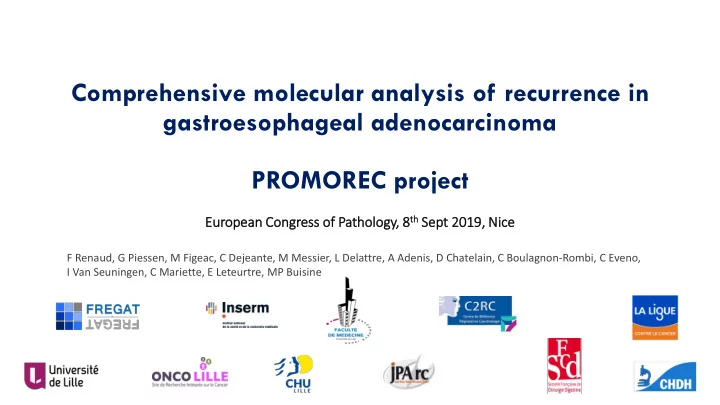

Comprehensive molecular analysis of recurrence in gastroesophageal adenocarcinoma PROMOREC project th Sep thology, 8 th Europea ean Con Congress of of Path ept t 2019, Nic ice F Renaud, G Piessen, M Figeac, C Dejeante, M Messier, L Delattre, A Adenis, D Chatelain, C Boulagnon-Rombi, C Eveno, I Van Seuningen, C Mariette, E Leteurtre, MP Buisine
Gastroesophageal adenocarcinoma TCGA ▪ High incidence in US and Europe n = 295 50% More than 1.6 million new cases 9% 1.3 million deaths expected in 2019 ▪ Model of multi-level tumor resistance ▪ Recurrence in more than 50% of patients ▪ Major efforts have been made to understand the biology of these tumors 21% 20% TCGA, Nature 2014, 2017 Cristescu et al, Nature Medicine 2015 Van Cutsem, Lancet 2016
Gastroesophageal adenocarcinoma ▪ However targeted therapies have had limited efficacy ▪ One potential reason could be genomic heterogeneity between primary and metastasis ▪ Biomarker profiling is routinely performed on a single site of GEA ▪ There is a critical need to understand the molecular features of the metastasis ✓ The objective was to assess the molecular profile of GEAs recurrence and to compare this profile with the one of the primary tumor Robinson et al, Nature 2017 Pectasides et al, Cancer Discov 2018 Janjigian et al, Cancer Discov 2018
Methods Oesophagus, gastroesophageal junction and gastric adenocarcinoma from Oct.2013 to July 2018 > 6 months PT MT Chemo/radio Chemo / radio Surveillance Diagnosis Recurrence Primary tumour (PT) Metastatic tumour (MT) NCT02526095 RBD ID FREGAT 2013-A01281-44
Study population PRIMARY TUMOUR METASTASIS Distant Distant, n = 35 Brain n = 5 Neck n = 1 Oesophagus, n = 37 Skin n = 1 Pleura n = 6 GE junction, n = 27 Locoregional, n = 21 Liver n = 10 Stomach, n = 20 Adrenal gland n = 7 Scrotum n = 1 Peritoneal, n = 35 Testis n = 1 Inguinal n = 1 Bone n = 2 n = 84 n = 91
Flowchart Eligible patients n = 84 Exploitable samples Paired PT and MT n = 74 IHC / ISH CGH array NGS Pyrosequencing n = 74 n = 35 n = 49 n = 61 HER2,� EGFR,� c-MET,� CDKN2A ,� RUNX3 ,� MMR,� EBV, Pangenomic 43� genes CACNA1G ,� p53,� E-cadherin,� specific to� GEA RASSF2 ,� MGMT ,� ARID1A,�MUC16,� MLH1 ,� CDH1 Mesothelin AnalysisOK AnalysisOK AnalysisOK AnalysisOK n=74 n=33 n=42 n=61
IHC Results ✓ Frequent co-expression of tyrosine kinase receptors in recurrence PT MT Non Tumor Overexpression: 11/70, 16% 2 discordances out of 70 paired samples HER2 Expression: 10/74, 13.5% 6 discordances out of 70 paired samples EGFR Overexpression 34/74, 46% c-MET 17 discordances out of 70 paired samples
IHC Results ✓ c-MET amplification limited to recurrence TI TR MT PT FISH MET : Amplification in MT (ratio 27) IHC Phospho-MET
IHC Results ✓ Frequent Mesothelin and MUC16 expression in recurrence MT NT TI PT TR Non Tumor Mesothelin MUC16
IHC Results ✓ Primary tumor and metastasis share the same molecular subgroup EBER- n = 2/74 ISH Negative Positive MLH1 « EBV » 4% n = 4/74 Normal Loss of expression « MSI » 7% E-cadherin n = 23/74 Normal Loss of expression « GS » 25% p53 n = 53/74 Aberrant Normal « CIN» 65% Ahn et al, Am J Surg Pathol 2017 TCGA, Nature 2014
NGS profile Concordance Primary tumor / Metastatic tumor ▪ 42 patients, 91 samples: 45 PT, 46 MT ▪ Mutations PT PT & ▪ TP53 : 61/91 (67%) MT MT ▪ CDH1 : 19/91 (21%) 79 57 85 ▪ ARID1A : 13/91 (14%) ▪ SMAD4 : 12/91 (13%) ▪ PIK3CA and KM2TC : 9/91 (10%) ▪ APC : 7/91 (8%) ▪ KRAS : 6/91 (6%) Mutation% PT vs. MT 80 TI TR PT MT 71 65 70 60 50 p = 0.001 40 30 21,7 20 15,5 15,21 20 13 13,3 13 11 8,8 8,8 6,5 6,5 10 4,4 4,4 0 TP53 CDH1 ARID1A SMAD4 PIK3CA KMT2C APC KRAS
MSI PT CGH array ✓ Alterations more frequent in metastasis MT CIN PT GS PT MT MT
CGH array ✓ Associated to distant metastasis +8q24, p = 0.03 ( MYC) +11q13, p = 0.04 (CCND1) Liu et al, Gastroenterology 2017 Mo et al, Cancer Res 2016 Kuroda et al, Plos One 2011 ✓ Associated to locoregional metastasis + 8q24, p = 0.03 ( MYC) +16p11, p = 0.03 ( DCTPP1 , PRR14 - PI3K pathway) Yang et al, Oncogene 2016 Kang, Oncol letter 2014 ✓ Focal amplifications in both primary & metastasis e.g. KRAS, EGFR Pectasides et al, Cancer Discov 2018 Janjigian et al, Cancer Discov 2018 Liu, Sethi et al, Cancer Cell 2018
Conclusion Molecular profiles are different between primary and recurrence in GEAs in -1/2 of patients Current tissue sampling practices for biomarker testing do not effectively guide precision medicine in this disease We confirmed here … on paired samples New biomarkers of recurrence ✓ Temporal heterogeneity ✓ PI3KCA alterations ✓ KRAS : amplifications/gain in >20% of patients ✓ MUC16 & mesothelin expression but mutations are rare ✓ biomarkers of recurrence: co-occuring TKR alterations, +8q24 ( MYC ), +11q13 ( CCND1 ) Pectasides et al, Cancer Discov 2018 Janjigian et al, Cancer Discov 2018 Liu, Sethi et al, Cancer Cell 2018 Wong et al, Nature Medicine 2018
Acknowledgements Inserm UMRS 1172, Lille University Hospital, Plateforme de Génomique structurale et Amiens University Hospital: Prof D Lille Cancer center : Prof MP Buisine, Prof E fonctionnelle (Lille University) : Dr M Figeac, C Chatelain, Tumor bank team Leteurtre, Prof G Piessen, Prof C Mariette, Prof A Villenet Adenis, Dr C Eveno, Dr M Messier, Dr C Dejeante, Reims University Hospital: Dr C Dr I Van Seuningen, L Delattre, L Stechly, Tumor Boulagnon-Rombi, tumor bank bank team Pathologists from Unilabs Lille, Saint Omer pathologie, Tourcoing, Strasbourg, Le Havre All the patients Fundings
Thank you
Recommend
More recommend